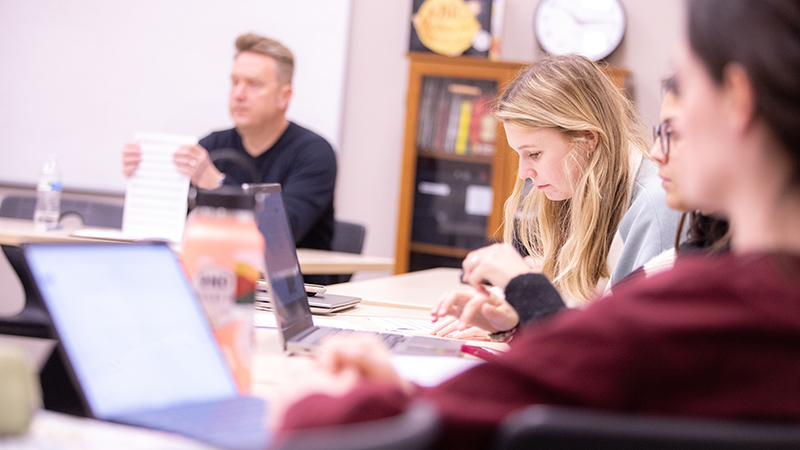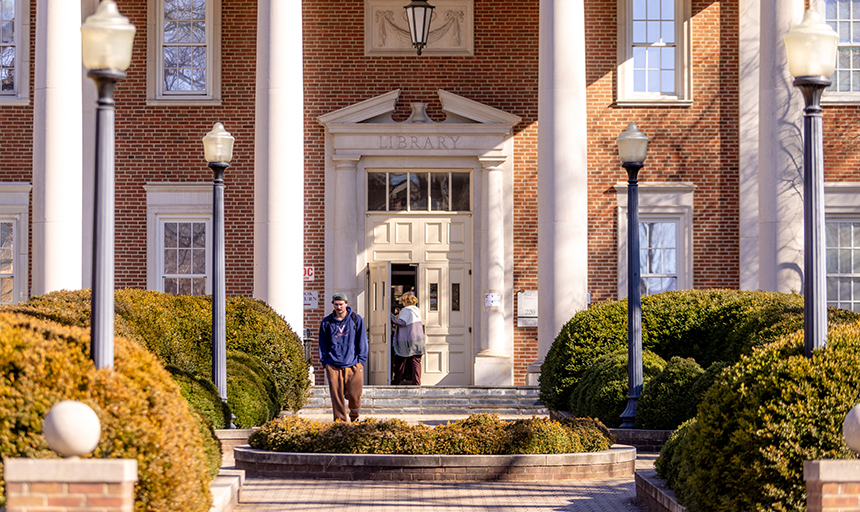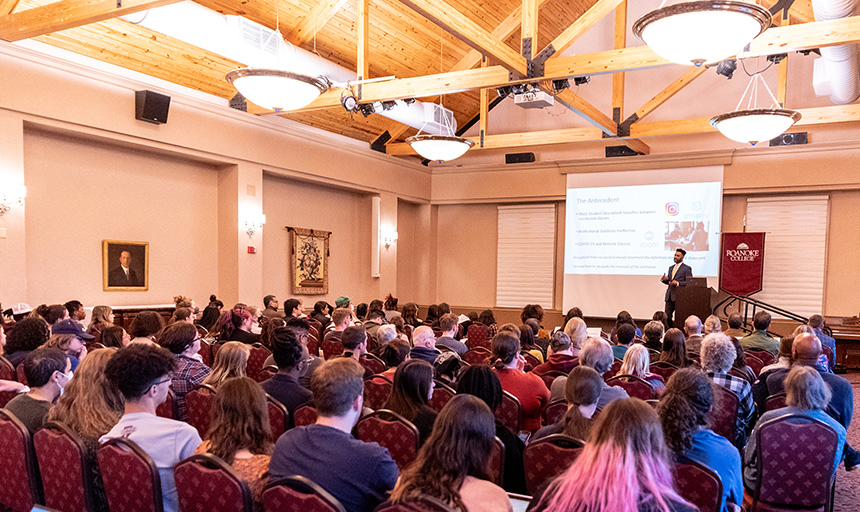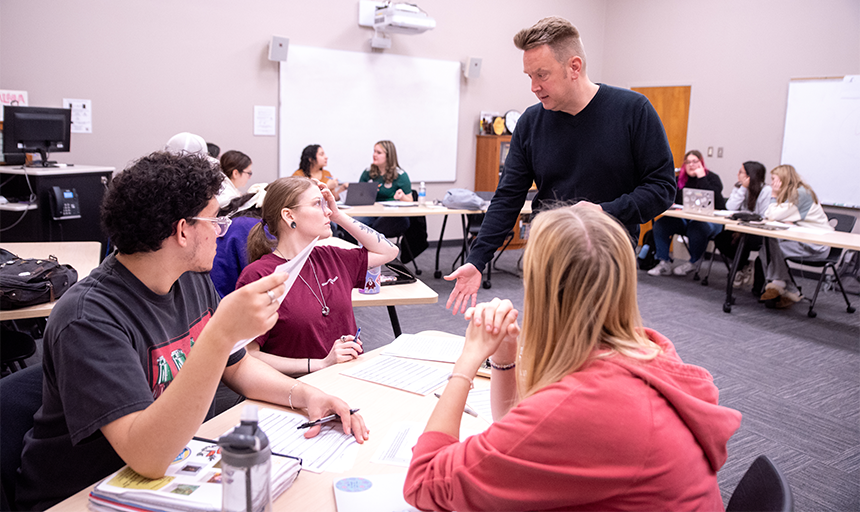Master of Education (M.Ed.)
Available as a master program
The Master’s degree offers the advanced study of pedagogy, curriculum, assessment and emerging trends in education, as well as a more in-depth exploration of educational theory and research. Students will primarily engage in secondary research, or practitioner research and projects, which could be literature, application/implementation, and action-based. This kind of research prepares individuals for roles within conventional settings and also beyond the classroom for positions such as community-based educators, curriculum developers, or educational consultants.

Program Introduction
Things to know about our program
- All classes are in-person at our main campus.
- All classes are taught at times accessible to working adults.
- The program takes one to two years to complete depending on full-time or part-time status.
- 10 courses must be completed.
- You can start at any time (fall, spring, early summer, summer I, summer II)
- For continuing education for teacher licensure, each course is worth 90 "recert" points.
Courses
The Master of Education (M.Ed.) requires the completion of 10 courses. All courses carry one unit of academic credit at Roanoke College, equivalent to 40 semester hours.
EDUC 510: What is Inquiry?
Description: What is the purpose of inquiry? What is its relationship to “knowing?” What are different modes and methods of inquiry? What do curiosity, imagination, and dreaming have to do with inquiry? This course critically examines philosophies/theories of inquiry. It brings into conversation traditional empirical methods, philosophical methods, and experiential, nontraditional modes of inquiry. The course includes a variety of formal and informal inquiry contexts, such as schooling, community, and cross-cultural contexts.
EDUC 520: Methods/Modes of Inquiry
Description: Why is empirical educational inquiry important and how do we engage in it? What methods and tools of inquiry may we use to explore educational issues and problems? This course invites students to participate in the processes and complexities of educational inquiry through collaborative problem-based learning and individual design of an action research blueprint.
EDUC 530: Legal/Political Issues in Education
Description: How do education philosophies manifest in education policy? Who decides which philosophies and values are reflected in education spaces? This course will examine education policies through various lenses and perspectives, give students the tools to engage in critical policy analysis, and culminate with “freedom dreaming” about policy that supports democratic educational spaces.
EDUC 540: Essential Discourses in Education
Description: How may we define education? What tenets are essential to a just and equitable education system? This course explores the fundamental concepts, theories, and debates within the field of education. Students will examine education policy, engage in critical discourse analysis, and develop a deep understanding of the diverse discourses that shape modern education.
EDUC 550: Instructional Systems Design
Description: How do we design context-appropriate instruction in a way which might maximize the probability of learning? What are the questions we need to ask so that the instruction we design will be appropriate to the needs of the learners? Once implemented, how do we know that our instruction was effective? How does an educational system make use of well-designed curricula to enable the most successful learning to occur? This course is a pragmatic, inquiry-based examination of the systematic planning, creation, and evaluation of instruction and the systemic impact such instruction may have.
EDUC 560: Community Pedagogies and the Anatomy of Practice
Description: In this course, students will engage in inquiry about the relationship between educational settings and the communities in which they are situated. Students will examine factors and strategies for creating and sustaining respectful, reciprocal, and empowering relationships with communities that enhance learner development. This course has a community fieldwork component which may require criminal background checks (i.e., “clearances”) of the students enrolled, for the protection of community members. The pedagogical/theoretical lens of inquiry for studying community pedagogies will vary depending on the instructor of record. Lenses may include but are not limited to, school and family relationships, policy and education, social/cultural institutions such as libraries and museums, performing arts communities, and education and the natural world.
EDUC 570: The Power of Theoretical Perspective
Description: How do you know what you know? With what lenses do you (and others) see the world and construct meaning in it? In this course, we will explore the theoretical perspectives that are behind some of the most controversial topics in education today. We will analyze how we might use those theories to build research-based arguments and then students will deeply dive into at least one of the theories, becoming conversant in its tenets so that they may explain them to others in the wider community.
EDUC 580: The Power of Empirical Inquiry
Description: How do research studies inform our understanding of an educational question, topic, and phenomenon? How can we use research studies to generate new questions? This course analyzes a topic of education through the lens of empirical studies. It serves the dual role of deeply examining an educational issue and developing the understanding of empirical inquiry. Topics will change based on the instructor of record for a given semester and will be drawn from current issues. Topics may include, but are not limited to, immigration, equity, race, class, and ethnicity as they relate to education.
EDUC 590: The Humanity of Learning
Description: In this course, students will engage in inquiry about the various psychosocial factors that influence and impact human learning. Students will consider the dynamic relationships that exist between the learner’s internal world of emotions and thought processes and the external world of relationships, family, and social and cultural networks. The pedagogy/theoretical lens of inquiry for studying the humanity of learning will vary based on instructor of record. Lenses may include, but are not limited to, culturally relevant pedagogy, culturally sustaining pedagogy, pedagogy of play, trauma-informed pedagogy and science of resilience, lifespan development, and more.
EDUC 596, 597, 598, 599: Applied inquiry Research
Description: A series of four quarter unit courses creating an active-learning experience requiring participants to apply an inquiry research methodology to generate a reasoned resolution to a current education problem. Course meetings serve as workshops to research, reflect, question, analyze, synthesize, plan, and create.
Program Learning Outcomes & Careers
Learning Outcomes
- Students will be able to examine and emphasize the integral connection between education and freedom.
- Students will be able to create an environment where educationists may imagine essential, transdisciplinary questions.
- Students will be able to connect educationists with others to build a collaborative, critical community.
- Students will be able to equip educationists with the tools and skills of inquiry necessary for rich investigatory work.
- Students will be able to discover and apply inquiry approaches that address real world, transdisciplinary challenges and create otherwise worlds in education.
The M.Ed. prepares individuals for
- Continuing education (i.e., roles in academia)
- Policymaking
- Corporate and non-profit training and industries with an educational component (museums, parks, educational tours, etc.)
- Jobs geared toward educational advocacy and justice (e.g., non-profit policy, public administration, private enterprise, etc.)
Admission Requirements & How to Apply
Requirements
- The Master of Education program is open to any student who has completed an undergraduate degree.
- To be considered for admission, graduate students must have a minimum cumulative grade point average of a 2.5 (on a 4.0 scale) on college transcripts.
- No more than two units of graduate credit may be transferred into the program and only at the discretion of the program director.
Guaranteed Admission
Roanoke College graduates with a 3.0 GPA are guaranteed admission, but need to apply.
How to Apply
Graduate students must submit the following when applying for admission to the M.Ed. program:
- A completed application. (Use the Roanoke application, not the Common app.)
- An official transcript of all college-level coursework.
- Two letters of recommendation. (Roanoke graduates with a 3.0 GPA and above only need one letter.)
- A resume with a personal statement.
How to Apply (Roanoke students with 3.0 GPA)
- A completed application. (Use the Roanoke application, not the Common app.)
- One letter of recommendation from a major professor.
Application Dates
- Fall a fall semester start, apply by 3/15.
- For a spring semester (Jan - April) start, apply by 10/15.
- For an early summer start, apply by 12/15.
- For a summer session one start, apply by 1/15.
- For a summer session two start, apply by 2/15.
Tuition and Fees
- $1990 per course
- Fees TBD from business office
There are no grants or scholarships and no graduate assistants.
The Office of Residence Life offers limited housing options for students enrolled in the graduate program, however housing if applicable will be charged at the same rates as undergraduate students. Housing is not included for spouses or families.
Graduate students may choose any meal plan currently available for the fall and spring semesters. While there are no summer meal plans, meals may be purchased as desired at open campus food locations.
Per Roanoke College policy, students should have tuition paid, or have sufficient loan coverage or payment plan in place prior to the start date of the term.
Faculty
News
-
The grant from the state Board of Education, which is believed to be the largest state grant ever received by Roanoke College, will allow the school to move forward with plans for a dual-enrollment lab school for local high school students.
-
The annual conference will bring together students, faculty and community leaders to explore important aspects of racial justice, AI ethics and more.
-
Roanoke’s second graduate degree program will launch in fall 2024, pending approval by SACSCOC.
The Master’s degree offers the advanced study of pedagogy, curriculum, assessment and emerging trends in education, as well as a more in-depth exploration of educational theory and research. Students will primarily engage in secondary research, or practitioner research and projects, which could be literature, application/implementation, and action-based. This kind of research prepares individuals for roles within conventional settings and also beyond the classroom for positions such as school administrators, curriculum developers, or educational consultants.
We offer a master's degree in Education (M.Ed.).


